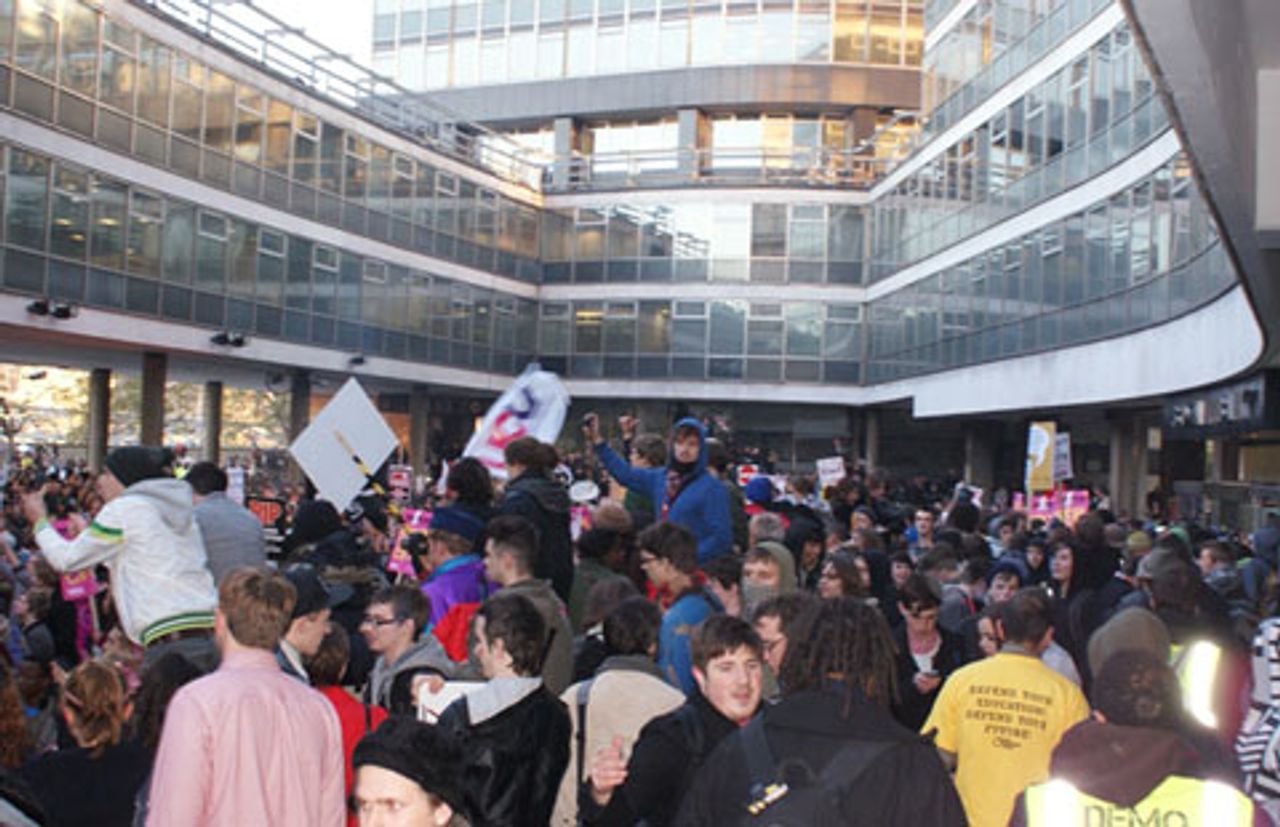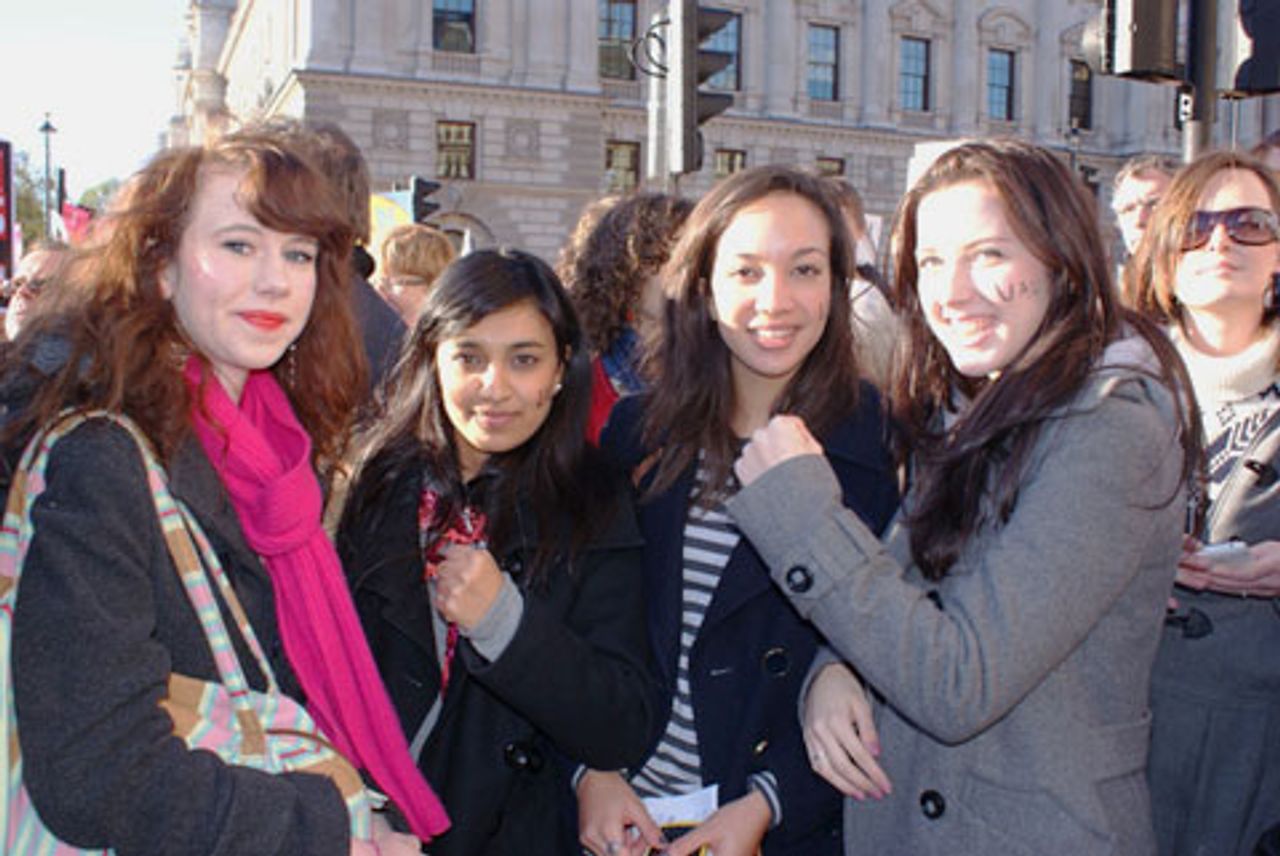Wednesday’s protest against the tripling of university tuition fees to £9,000 a year and savage cuts in funding attracted over 50,000 to London, both students and academics.
Anger against the Conservative-Liberal Democrat government erupted after police responded in force to an invasion of the Tory Party HQ at Millbank Tower.
 Protesters assemble outside Tory HQ
Protesters assemble outside Tory HQThousands of students cheered on the hundreds who occupied the building’s foyer after its glass frontage was smashed. The police arrested over 30 people and attacked many more.
The march was organised by the National Union of Students (NUS) and the University and College Union (UCU).
As could have been expected, the NUS immediately joined in a media chorus denouncing the protest at Tory HQ, with NUS President Aaron Porter describing it as “shameful, dangerous and counterproductive.” But postings by many online were supportive of a stand they felt gave at least partial expression to their own bitterness over the government’s broader austerity programme.
World Socialist Web Site reporters spoke to students and academics taking part in the demonstration.
 Hannah (right), Darshi (second from left) and friends
Hannah (right), Darshi (second from left) and friendsHannah was with a group of friends from the University of the Arts in London. She said, “We are here because we disagree with the cuts like everyone else. The arts are often overlooked, so any cuts will make it even worse. It’s really not good news.
“I’ve been on other protests, like against the Iraq war. There were millions of people and it made no difference, but you have to stand up to be counted. In this country we are famous for freedom of speech. They must not cut these things.”
Darshi Shah added, “If they raise the fees no one is going to be able to afford to go to university anymore. Already you come out of university with £24,000 worth of debt. It’s hard enough getting loans, especially if you live in and around London. You won’t be able to afford to go to university, never mind live here!
“The future is not bright. If they say you need education to get into jobs in industry, then what’s the point in cutting education? How are you supposed to get the education to get the job you want? If you need skills in something you obviously have to go to university.”
 Robert Head
Robert HeadRobert Head from Chichester University said, “It’s not so much for us, but for future students who want to come to university. We want equal opportunities for everybody and no impediments to future higher education. There has to be a mass gathering to change things. I’m for working class improvement, equality of tax.
“I don’t know how many people are here today, but the issue is a burning one and we won’t let it go unlike issues like the Iraq war that have dissipated. We won’t let it drop. People are passionate about it, not just students, but non-students, academics, people who work in the public sphere.
“The bailout of the banks was disgusting. It happened all over the world. They are not doing anything beneficial to society. They work for their own self improvement and not for the areas in which they live, or for the country. So their fat bonuses shouldn’t be tolerated.”
 Professor Nicholas Till
Professor Nicholas TillProfessor Nicholas Till of the University of Sussex said, “I’m here today to show the government that their proposals for what they call reform of university education are completely unacceptable. They will not only destroy the quality of education and research in this country, but will also disadvantage hundreds of thousands of young people wanting an education.
“You have to use all possible strategies. This is only one, but it’s important the government understands what the scale of anger is about the way they are forcing through basically a neoliberal programme to privatise education.
“The last 20 years have seen some stability, but we are now entering a period of extreme instability and uncertainty for everybody. Already the impact of the changes is beginning to show. Our university last year sacked 10 percent of staff across the board―academic, administrative and so on. They negotiated redundancies, but effectively it was axing 10 percent of jobs. In my department we have lost one third of our faculty. That impacts on our work.
 Students stage sit-in protest
Students stage sit-in protest“The austerity measures are part of a broad neoliberal project, in which this government has taken advantage of the behaviour of the banks to implement swinging cuts in public services―which is what they always wanted to do. We are being told it’s a necessity, that there is no alternative. But it’s a political choice.
“We have to understand that this is not just about education. It’s about the public sector. Ensuring equality is an issue whether it’s in education or in all aspects of life. The protests in France didn’t change the policies. We have governments that don’t pay much attention to democratic voices of dissent.”
Lisa from Goldsmiths University said, “I’m here today because it’s a really good cause. University education is really important. It’s about showing public support and seeing how the government reacts. We voted for them, so if they don’t show they are for us why should we vote for them anymore?
“I come from Goldsmiths University, an arts college. The cuts will be affecting our college more than a normal university because nearly all our courses are arts and humanities. If this doesn’t work, we have to rethink strategies that might create more effective ways to get the desired results. This is the first time I’ve joined a protest. I’m from a country that does not do protests! Your programme sounds very good. I hope you guys get more support.”
 Tama
TamaTama from Bath said, “I’m here today because I disagree with the changes to the higher education system. I disagree with them increasing fees and also with the cuts they are suggesting. I go to Goldsmiths, which is an arts and humanities college. So they will be losing 100 percent of their teaching funding because the subjects are not stem subjects.
“I believe that education should be free for everyone, not just those who can afford to pay for it. It’s not just about getting a high paid job or gaining graduate skills to go into marketing, or whatever. It’s about wanting to learn. There are lots of subjects that are being cut that are absolutely vital. If the closures go through it would discourage a lot of people from going to university and pursuing the things that they are interested in.
“This protest can let them know that this is how people feel and the sheer scale of this protest shows how many people actually care―not forgetting the fact that the Liberal Democrats did actually pledge not to raise fees. We will be holding them to it and I think that this and all the strikes that are going on are the first beginnings of a long campaign by the people of this country that they are not happy at all. I hope it will change the government’s mind and they will wake up to what people are saying.
“They say we are all in this together and we’re not. You can see who is losing out here. It’s not the banks and the big businesses. So I think more pressure like this could show them that we know what’s going on and we are not happy to let it happen without a fight.”
Linda, a lecturer for 20 years, said, “I’m opposed to the privatisation of education. I’m from a university with a wide variety of students―rich students, overseas students, but also a lot of students that come from poor working class families in Britain. And I know what the impact of these cuts will be. The poorer students are not going to be able to come to university. That’s why I’m here.
“It’s been a gradual process of privatisation. But I think there are going to be private companies coming in and taking over universities―running the profitable courses. My subject, humanities and social sciences, will be threatened by that, because it will be seen as not profitable.
“The cuts will affect the quality of education. The university where I work is already implementing cuts, which are impacting on your work programme. It means you can’t deliver the type of education you want to give students. There’s not the hours for teaching and it’s the teaching that really suffers as research is driven into profitable areas.”
Fill out the form to be contacted by someone from the WSWS in your area about getting involved.
